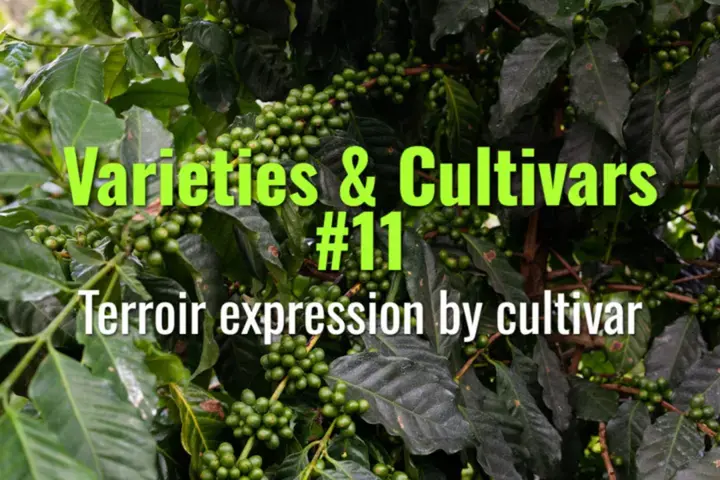Terroir expression by cultivar
This topic explains how different coffee cultivars express terroir—the interaction of genetics with environment—shaping cup profiles, identity, and consumer appreciation of origin.
- Coffee Basics Nerds
- 2 min read
Article 11 of 12 in Varieties & Cultivars/

What is Terroir?
- Definition: Terroir refers to the combination of soil, climate, altitude, and local environment that influences agricultural products.
- In coffee: Terroir interacts with a cultivar’s genetics to define flavor, aroma, and body.
Cultivar Influence on Terroir Expression
- Gesha (Geisha): Thrives at high altitudes (>1,600 m). In Panama, expresses jasmine, bergamot, and tropical fruits. In lower altitudes, flavors flatten.
- SL28 / SL34 (Kenya): Express terroir through blackcurrant, citrus, and vibrant acidity, especially in Kenya’s volcanic soils and moderate rainfall.
- Bourbon: In Rwanda and Burundi, produces syrupy, red-fruited coffees with complex acidity.
- Typica: Shows clean, sweet citrus and floral notes in Central America when grown under shade and cool climates.
- Pacamara: Displays bold, fruity-winey flavors in El Salvador’s highlands but inconsistent results in lower elevations.
- Ethiopian Heirlooms: Wild genetic diversity yields floral, tea-like, and stone-fruit flavors linked strongly to Ethiopia’s unique terroirs.
Environmental Drivers of Expression
- Altitude: Higher elevations → slower cherry maturation → denser beans and brighter acidity.
- Soil: Volcanic soils enrich minerals, enhancing complexity.
- Rainfall & microclimate: Patterns of wet/dry seasons influence flowering and uniformity of ripening.
- Shade & biodiversity: Shade slows ripening, often improving sweetness and complexity.
Terroir vs Cultivar Interaction
- The same cultivar expresses differently depending on terroir:
- Gesha in Panama ≠ Gesha in Colombia.
- Bourbon in El Salvador ≠ Bourbon in East Africa.
- Terroir amplifies or mutes genetic potential.
Implications for Farmers & Markets
- Farmers: Must match cultivars to terroir for optimal results.
- Specialty coffee: Market rewards terroir expression with premium pricing.
- Consumer education: Labels highlighting both cultivar and origin help communicate terroir.
Lasting Importance
Terroir expression by cultivar underscores coffee’s agricultural artistry. The marriage of genetics and environment creates unique flavor identities, driving specialty coffee’s celebration of diversity and origin stories.
You might also like:
- Tags:
- Lasting Importance
- Specialty Coffee
- Central America
- Terroir Expression
- Genetic Diversity
- Dry Seasons
- El Salvador
- Denser Beans
- Flavor Aroma
- Premium Pricing
- Cherry Maturation
- Floral Notes
- Volcanic Soils
- East Africa
- Wet Dry
- Lower Altitudes
- Higher Elevations
- Stone Fruit
- Clean Sweet
- Maturation Denser
- Sweetness Complexity
- Brighter Acidity
- Tropical Fruits